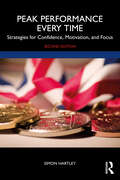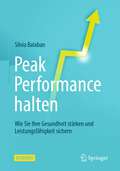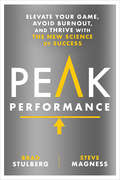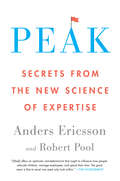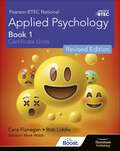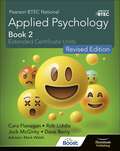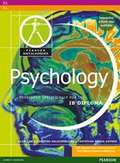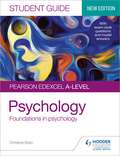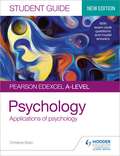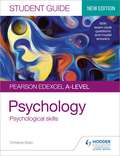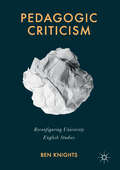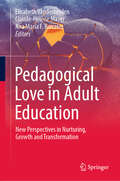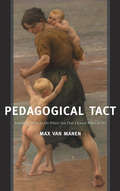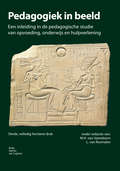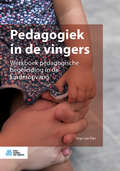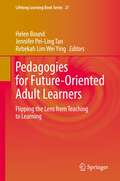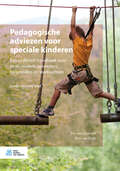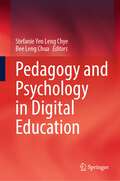- Table View
- List View
Peak Performance Every Time: Strategies for Confidence, Motivation, and Focus
by Simon HartleyMost people have good days…and not so good days. When they step back and ask what makes the difference, many conclude that it’s that stuff that happens between their ears. So, how do we engineer our mindset? How do we get our mental game right, so that we can perform at our best, consistently? Peak Performance Every Time provides readers with a detailed look into how to build the critical components of a great mental game. It will help them to hone their focus, control their confidence, master motivation and deliver their best ‘under pressure’. In short, it will help deliver peak performance, every time. The book provides a practical guide to performance psychology, based on approaches and methods that have been tried and tested in the demanding world of elite sport. In addition to applied practice, it provides real life examples and case studies from both elite sport and business, plus the underpinning theory and research. This book will be invaluable to anyone trying to reach their full potential, in particular athletes, coaches, managers and executives. It may also be of interest to sports psychology, management and business students.
Peak Performance for Smart Kids
by Maureen NeihartPeak Performance for Smart Kids provides success strategies, activities, tools, real-life examples, and checklists for parents to employ to help their kids achieve to their highest potential. Even the most talented child will not succeed if he or she has not developed the mental, psychological, and emotional skills to face the heavy demands of high performance. Maureen Neihart, a psychologist and leading authority on talent development in children, examines seven mental habits of successful kids, providing practical approaches for developing them in talented children of all ages in this easy-to-read guide for parents and teachers.By working with parents to complete the activities included in this book, high-ability kids will learn to manage stress and anxiety, set and achieve goals, use mental rehearsal to improve performance, manage their moods and emotions, practice optimistic thinking, and resolve their frustrations of needing to belong while needing to achieve. With its research-based strategies and unique approach to maximizing potential, this is a book from which every parent of smart kids can benefit!
Peak Performance halten: Wie Sie Ihre Gesundheit stärken und Leistungsfähigkeit sichern
by Silvia BalabanAls Leistungsträger liefern Sie 24/7 mentale Höchstleistung: zunehmende Arbeitsverdichtung, Entscheidungsdauerfeuer und ASAP-isierung gekoppelt mit ständiger Erreichbarkeit und den Folgen von Globalisierung, sowie wirtschaftlichen und politischen Krisen. All das zehrt an Ihrer Energie. All das geht auf Kosten Ihrer Gesundheit. Um ein Auspowern zu vermeiden, ist ein wirkungsvolles, wissenschaftlich fundiertes Trainings- und Regenerationskonzept erforderlich, wie es im Leistungssport seit Jahren Standard ist. Daher bilden neueste Methoden und objektiv messbare Daten aus der Stressmedizin die Basis dieses Buches. Erfahren Sie, wie Sie durch biochemische und biophysische Parameter Ihre Kraft und Regeneration qualitativ verbessern können, denn Fakten schaffen Sicherheit. Praxisnah und leicht verständlich informiert dieser Ratgeber mit Selbstchecks, Fallbeispielen und Praxistipps über die wichtigsten Gesundheitsgrundlagen für berufliche Peak Performance Situationen. Fundiertes Wissen, damit Sie neue Stärke tanken und zukünftige Herausforderungen wieder mit Gelassenheit meistern können.
Peak Performance: Elevate Your Game, Avoid Burnout, and Thrive with the New Science of Success
by Brad Stulberg Steve Magness"A transfixing book on how to sustain peak performance and avoid burnout" —Adam Grant, New York Times bestselling author of Option B, Originals, and Give and Take"An essential playbook for success, happiness, and getting the most out of ourselves." Arianna Huffington, author of Thrive and The Sleep Revolution"I doubt anyone can read Peak Performance without itching to apply something to their own lives." —David Epstein, New York Times bestselling author of The Sports GeneA few common principles drive performance, regardless of the field or the task at hand. Whether someone is trying to qualify for the Olympics, break ground in mathematical theory or craft an artistic masterpiece, many of the practices that lead to great success are the same. In Peak Performance, Brad Stulberg, a former McKinsey and Company consultant and writer who covers health and the science of human performance, and Steve Magness, a performance scientist and coach of Olympic athletes, team up to demystify these practices and demonstrate how you can achieve your best.The first book of its kind, Peak Performance combines the inspiring stories of top performers across a range of capabilities—from athletic to intellectual and artistic—with the latest scientific insights into the cognitive and neurochemical factors that drive performance in all domains. In doing so, Peak Performance uncovers new linkages that hold promise as performance enhancers but have been overlooked in our traditionally-siloed ways of thinking. The result is a life-changing book in which you can learn how to enhance your performance via myriad ways including: optimally alternating between periods of intense work and rest; priming the body and mind for enhanced productivity; and developing and harnessing the power of a self-transcending purpose.In revealing the science of great performance and the stories of great performers across a wide range of capabilities, Peak Performance uncovers the secrets of success, and coaches you on how to use them. If you want to take your game to the next level, whatever "your game" may be, Peak Performance will teach you how.
Peak: Secrets from the New Science of Expertise
by Robert Pool Anders EricssonFrom the world's reigning expert on expertise comes a powerful new approach to mastering almost any skill. Have you ever wanted to learn a language or pick up an instrument, only to become too daunted by the task at hand? Expert performance guru Anders Ericsson has made a career studying chess champions, violin virtuosos, star athletes, and memory mavens. Peak condenses three decades of original research to introduce an incredibly powerful approach to learning that is fundamentally different from the way people traditionally think about acquiring a skill. Ericsson's findings have been lauded and debated, but never properly explained. So the idea of expertise still intimidates us -- we believe we need innate talent to excel, or think excelling seems prohibitively difficult. Peak belies both of these notions, proving that almost all of us have the seeds of excellence within us -- it's just a question of nurturing them by reducing expertise to a discrete series of attainable practices. Peak offers invaluable, often counterintuitive, advice on setting goals, getting feedback, identifying patterns, and motivating yourself. Whether you want to stand out at work, or help your kid achieve academic goals, Ericsson's revolutionary methods will show you how to master nearly anything.
Pearson BTEC National Applied Psychology: Book 1 Revised Edition
by Cara Flanagan Mark Walsh Rob LiddlePublishing Spring 2022. / Both BTEC Applied Psychology Books 1 and 2 are being revised to match the revised Unit 1 and Unit 3 specifications for first teaching from September 2021. / Unit 1 - Psychological approaches and applications completely revised and updated. / Endorsed for BTEC. / Each book provides knowledge and evaluation of theories and studies combined with many engaging activities which deliver the vocational element. / Activities aim to prepare students for internal and external assessments. / The brilliant visual style and tone will encourage students through every step of the course.
Pearson BTEC National Applied Psychology: Book 2
by Cara Flanagan Mark Walsh Dave Berry Rob Liddle Jock McGintyPublishing Spring 2022. / Both BTEC Applied Psychology Books 1 and 2 are being revised to match the revised Unit 1 and Unit 3 specifications for first teaching from September 2021. / Unit 3 - Health psychology completely revised and updated. / Endorsed for BTEC. / Each book provides knowledge and evaluation of theories and studies combined with many engaging activities which deliver the vocational element. / Activities aim to prepare students for internal and external assessments. / The brilliant visual style and tone will encourage students through every step of the course.
Pearson Baccalaureate Psychology
by Alan Law Christos Halkiopoulos Christian Bryan-ZaykovA textbook for students and teachers of the International Baccalaureate Diploma, written and developed by practicing IB teachers.
Pearson Edexcel A-level Psychology Student Guide 1: Foundations in psychology
by Christine BrainReinforce understanding throughout the course with clear topic summaries and sample questions and answers to help students target higher grades.Written by experienced teacher and subject expert Christine Brain, our Student Guides are divided into two key sections - content guidance, and sample questions and answers.Content guidance will:- - Develop understanding of key concepts and terminology; this guide covers foundations in psychology: social psychology, cognitive psychology, biological psychology and learning theories.- - Consolidate knowledge with 'knowledge check questions' at the end of each topic and answers in the back of the book.Sample questions and answers will:- - Build understanding of the different question types, so that students can approach each question with confidence.- - Enable students to target top grades in Paper 1 with sample answers and commentary explaining exactly why marks have been awarded.
Pearson Edexcel A-level Psychology Student Guide 1: Foundations in psychology
by Christine BrainReinforce understanding throughout the course with clear topic summaries and sample questions and answers to help students target higher grades.Written by experienced teacher and subject expert Christine Brain, our Student Guides are divided into two key sections - content guidance, and sample questions and answers.Content guidance will:- - Develop understanding of key concepts and terminology; this guide covers foundations in psychology: social psychology, cognitive psychology, biological psychology and learning theories.- - Consolidate knowledge with 'knowledge check questions' at the end of each topic and answers in the back of the book.Sample questions and answers will:- - Build understanding of the different question types, so that students can approach each question with confidence.- - Enable students to target top grades in Paper 1 with sample answers and commentary explaining exactly why marks have been awarded.
Pearson Edexcel A-level Psychology Student Guide 2: Applications of psychology
by Christine BrainReinforce understanding throughout the course with clear topic summaries and sample questions and answers to help students target higher grades.Written by experienced teacher and subject expert Christine Brain, our Student Guides are divided into two key sections - content guidance, and sample questions and answers.Content guidance will:- - Develop understanding of key concepts and terminology; this guide covers applications of psychology: clinical, criminological, child and health psychology.- - Consolidate knowledge with 'knowledge check questions' at the end of each topic and answers in the back of the book.Sample questions and answers will:- - Build understanding of the different question types, so that students can approach each question with confidence.- - Enable students to target top grades in Paper 2 with sample answers and commentary explaining exactly why marks have been awarded.
Pearson Edexcel A-level Psychology Student Guide 2: Applications of psychology
by Christine BrainReinforce understanding throughout the course with clear topic summaries and sample questions and answers to help students target higher grades.Written by experienced teacher and subject expert Christine Brain, our Student Guides are divided into two key sections - content guidance, and sample questions and answers.Content guidance will:- - Develop understanding of key concepts and terminology; this guide covers applications of psychology: clinical, criminological, child and health psychology.- - Consolidate knowledge with 'knowledge check questions' at the end of each topic and answers in the back of the book.Sample questions and answers will:- - Build understanding of the different question types, so that students can approach each question with confidence.- - Enable students to target top grades in Paper 2 with sample answers and commentary explaining exactly why marks have been awarded.
Pearson Edexcel A-level Psychology Student Guide 3: Psychological skills
by Christine BrainReinforce understanding throughout the course with clear topic summaries and sample questions and answers to help students target higher grades.Written by experienced teacher and subject expert Christine Brain, our Student Guides are divided into two key sections - content guidance, and sample questions and answers.Content guidance will:- - Develop understanding of key concepts and terminology; this guide covers psychological skills, including methods, a synoptic review of studies, issues and debates.- Consolidate knowledge with 'knowledge check questions' at the end of each topic and answers in the back of the book.Sample questions and answers will:- - Build understanding of the different question types, so that students can approach each question with confidence.- - Enable students to target top grades in Paper 3 with sample answers and commentary explaining exactly why marks have been awarded.
Pearson Edexcel A-level Psychology Student Guide 3: Psychological skills
by Christine BrainReinforce understanding throughout the course with clear topic summaries and sample questions and answers to help students target higher grades.Written by experienced teacher and subject expert Christine Brain, our Student Guides are divided into two key sections - content guidance, and sample questions and answers.Content guidance will:- - Develop understanding of key concepts and terminology; this guide covers psychological skills, including methods, a synoptic review of studies, issues and debates.- Consolidate knowledge with 'knowledge check questions' at the end of each topic and answers in the back of the book.Sample questions and answers will:- - Build understanding of the different question types, so that students can approach each question with confidence.- - Enable students to target top grades in Paper 3 with sample answers and commentary explaining exactly why marks have been awarded.
Peculiar Attunements: How Affect Theory Turned Musical
by Roger Mathew GrantPeculiar Attunements places the recent turn to affect into conversation with a parallel movement in European music theory of the eighteenth century. During that time the affects—or passions, as they were also called—formed a vital component of a mimetic model of the arts. Eighteenth-century critics held that artworks imitated or copied the natural world in order to produce copies of the affects in their beholders. But music caused a problem for such theories, since it wasn’t apparent that musical tones could imitate anything with any dependability, beyond the rare thunderclap or birdcall.Struggling to articulate how it was that music managed to move its auditors without imitation, certain theorists developed a new affect theory crafted especially for music, postulating that music’s physical materiality as sound vibrated the nerves of listeners and attuned them to the affects through sympathetic resonance. This was a theory of affective attunement that bypassed the entire structure of representation, offering a non-discursive, corporeal alternative. It is a pendant to contemporary theories of affect, and one from which they have much to learn. Inflecting our current intellectual moment through eighteenth-century music theory and aesthetics, this book offers a reassessment of affect theory’s common systems and processes. It offers a new way of thinking through affect dialectically, drawing attention to patterns and problems in affect theory that we have been given to repeating. Finally, taking a cue from eighteenth-century theory, it gives renewed attention to the objects that generate affects in subjects.
Pedagogic Criticism
by Ben KnightsThis book argues that the history of English Studies is embedded in its classroom practice, and its practice in its history. Some of its foundational struggles are still being lived out today. English is characterized as a 'boundary' subject, active in dialogue across a number of imagined borders, especially those between academic and non-specialized readerships. While the subject discipline maintains strong pedagogic principles, many of its principles and values are obscure or even invisible to students and potential students. The book cross-fertilizes the study of English as a subject with the analysis of selected literary texts read as pedagogic parables. It concludes with a call for a return to the subject's pedagogic roots.
Pedagogical Love in Adult Education: New Perspectives in Nurturing, Growth and Transformation
by Elisabeth Vanderheiden Claude-Hélène Mayer Ana Maria F. BarcelosThis volume explores the concept of pedagogical love, highlighting its role as a transformative force across diverse educational contexts, historical developments, and its integration into educational systems. It provides both theoretical insights and methodological approaches to pedagogical love. The book opens with foundational chapters introducing the concept and progresses to situating it within frameworks such as decolonisation and critical pedagogy. It further examines its potential in teacher education, addressing specific pedagogical domains such as second language acquisition and literacy, as well as cultural contexts spanning Asia, Europe, Africa, and the Americas. Moreover, the book investigates the implications of pedagogical love in current transformations and digitalisation, with particular attention to fully digital environments and artificial intelligence. By offering a comprehensive overview and presenting innovative perspectives for research in adult education, this book serves as an essential resource for researchers, educators, and practitioners. "This edited collection delves into the transformative power of pedagogical love in adult education, challenging conventional views of love as merely &‘soft&’ and personal. By exploring critical and decolonial perspectives, the book opens new avenues for research and practice, advocating for love as a profound ethical and political force to confront social injustices and transform educational spaces…Bridging critical and decolonial approaches, this volume reimagines pedagogical love as a key to transformation in adult education. It moves beyond sentimental notions to show how love can address challenges like violence, colonialism, and social inequity, offering a renewed perspective on love&’s role in shaping the future of education" Michalinos Zembylas, Open University of Cyprus "Pedagogical love is the root and foundation of all adult education" Kaarina Määttä, Professor (emerita), University of Lapland
Pedagogical Tact: Knowing What to Do When You Don’t Know What to Do (Phenomenology of Practice #1)
by Max Van ManenPedagogical Tact describes how teacher-student relations possess an improvisational and ethical character. The daily realities of educators, parents, and childcare specialists are pedagogically conditioned by sensitive insights, active thoughtfulness, and the creative ability to act caringly and appropriately in the immediacy of the moment. Internationally known educator Max van Manen shows through recognizable examples and evocative stories how good teaching is driven by the phenomenology of pedagogy. His book-refocuses educators and others away from an emphasis on instrumental skills and technocratic programs toward the need for pedagogical tact;-describes how pedagogical actions have latent effects that will influence children throughout their lives;-shows how our actions with young people have pedagogically ethical and moral significance;-gives educators back their original vocational motivation and inspiration.
Pedagogiek in beeld: Een inleiding in de pedagogische studie van opvoeding, onderwijs en hulpverlening
by M. H. IJzendoorn L. RosmalenPedagogiek in beeld biedt een kijkje in de wetenschappelijke keuken van de pedagogiek en is daarmee een inleiding in de studie van opvoeding, onderwijs en hulpverlening. Het boek geeft een helder beeld van enkele belangrijke uitkomsten van pedagogisch onderzoek in Nederland en laat zien hoe die resultaten tot stand zijn gekomen. Daarbij komen de belangrijkste werkvelden aan bod: algemene pedagogiek, gezinspedagogiek, orthopedagogiek, leerproblemen en onderwijspedagogiek. Concrete voorbeelden van onderzoek maken duidelijk wat de pedagogiek heeft gepresteerd en wat in de toekomst van deze discipline mag worden verwacht.
Pedagogiek in de vingers: Werkboek pedagogische begeleiding in de kinderopvang
by Inge Van RijnDit werkboek geeft praktijkgerichte adviezen om met pedagogisch medewerkers in gesprek te gaan over hun werk. Het laat zien hoe je samen na kunt denken over de pedagogische taken van het kindercentrum. Sinds 2019 moet iedere pedagogisch medewerker worden gecoacht door een pedagogisch begeleider. Dat stelt de wet Innovatie Kwaliteit Kinderopvang (IKK) verplicht. Kindercentra zitten te springen om goed opgeleide begeleiders. Met dit boek krijgen opleidingen en begeleiders in kindercentra praktische ‘tools’ aangereikt waarmee ze direct in de praktijk aan de slag kunnen. Bij ieder hoofdstuk staan concrete opdrachten en tips. Het boek is geschreven in een taal die de medewerkers uit de kinderopvang begrijpen en die hen aanspreekt. De alledaagse praktijk van de kinderopvang komt tot leven in sprekende voorbeelden. Dringende pedagogische vragen komen aan bod. Hoofdpersonen in het boek zijn de pedagogisch medewerkers: hun taken op de werkvloer staan centraal.
Pedagogies for Future-Oriented Adult Learners: Flipping the Lens from Teaching to Learning (Lifelong Learning Book Series #27)
by Helen Bound Jennifer Pei-Ling Tan Rebekah Lim Wei YingThis book presents a collection of chapters—both empirical and conceptual—that challenge existing paradigms of learning and teaching, provides examples of pedagogical spaces and practices that nurture future-oriented learners, explicates identities and transitions in learning, and offers alternative frames for moving forward.Educational structures have proven remarkably resilient. More often than not, pedagogical designs still privilege the lecture-tutorial format, front-end loading and the positioning of the ‘teacher’ as expert. In a similar vein, pedagogical spaces tend to privilege the formal educational institution and its discourses, rather than productively engage with naturally-occurring learning spaces at work and in communities. To better prepare and support learners for dynamically changing futures, we need to truly flip the lens from teaching to learning, positioning at the core, the learner in contexts where learning and becoming occurs. This means considering what counts as a future-oriented learner and educator, recognising the importance of evolving identities, transitions and pathways that facilitates the processes of being and becoming. Equally important is the design and appropriation of pedagogical spaces and practices that are in themselves dynamic and future-oriented. This book questions the current delineation between the spaces of work, learning and communities.
Pedagogies to Enhance Learning for Indigenous Students
by Peter Sullivan Peter Grootenboer Robyn JorgensenThis book describes research undertaken by leading Australian researcher in Indigenous communities. While the chapters are Australian in their focus, the issues that are discussed are similar to those in other countries where there are indigenous people. In most cases, in Australia and internationally, Indigenous learners are not succeeding in school, thus making the transition into work and adulthood quite tenuous in terms of mainstream measures. The importance of being literate and numerate are critical in success in school and life in general, thus making this collection an important contribution to the international literature. The collection of works describes a wide range of projects where the focus has been on improving the literacy and numeracy outcomes for Indigenous students. The chapters take various approaches to improving these outcomes, and have very different foci. These foci include aspects of literacy, numeracy, curriculum leadership, ICTs, whole school planning, policy, linguistics and Indigenous perspectives. Most of the chapters report on large scale projects that have used some innovation in their focus. The book draws together these projects so that a more connected sense of the complexities and diversity of approaches can be gleaned.
Pedagogische adviezen voor speciale kinderen: Een Praktisch Handboek Voor Professionele Opvoeders, Begeleiders, Leerkrachten
by Ron Van Deth Trix Van LieshoutDit boek is ontstaan vanuit vragen uit het werkveld om concrete, praktische adviezen voor de begeleiding van kinderen en jongeren met extra ondersteuningsbehoeften. Deze adviezen worden hierin uitvoerig besproken. De nadruk ligt op oplossingsgericht werken: mét jongeren zoeken naar wat al wél goed gaat, wat zij nog nodig hebben en wat voor hen goed werkt.Door zijn eenduidige structuur is het boek zowel een naslagwerk als een praktisch handboek. Bij alle probleemgebieden komen het beeld, de oorzaken, behandelingen, prognose en concrete handelingssuggesties aan de orde.Deze geheel herziene derde druk maakt gebruik van het nieuwe DSM-5 classificatiesysteem, waarbij wij ook de nadelen van etiketteren bespreken. Alle hoofdstukken zijn geactualiseerd.Het boek is geschreven voor (aankomend) orthopedagogen, psychologen, leerkrachten, intern begeleiders, (vak)docenten, zorgcoördinatoren, maatschappelijk werkers, kinder- en jeugdartsen en voor opleidingen in Hoger Beroepsonderwijs en Universiteit.Trix van Lieshout was als orthopedagoog en gezondheidszorgpsycholoog ruim 35 jaar werkzaam in het Voortgezet (Speciaal) Onderwijs. Zij schreef eerder Druk, druk, druk. Praktische tips voor de opvoeding van kinderen met ADHD. Momenteel geeft ze lezingen over pedagogisch vakmanschap. Website: www.trixvanlieshout.nlRon van Deth is psycholoog en publicist, verbonden aan het Europees Instituut voor Educatie in Driebergen. Hij was jarenlang docent in verschillende vormen van onderwijs en eindredacteur van PsychoPraktijk. Eerder schreef hij onder andere Psychiatrie: van diagnose tot behandeling en Inleiding in de psychopathologie.
Pedagogy and Psychology in Digital Education
by Stefanie Yen Leng Chye Bee Leng ChuaThis book brings together latest research which explores the intersection between educational psychology and educational technology. It consolidates contemporary research on the psychological dimension of technology-based learning, and how new learning technologies can impact learners. More specifically, it provides a better understanding of the affordances of technology-based learning, and how they impact the cognitive and affective processes of learners, facilitate new pedagogical approaches, and transform learning environments. It discusses how technology can be used to develop twenty-first-century competencies such as creativity, critical thinking, problem-solving skills, digital literacy, reflection, and lifelong learning, and explores the pitfalls, challenges and dangers therein.
